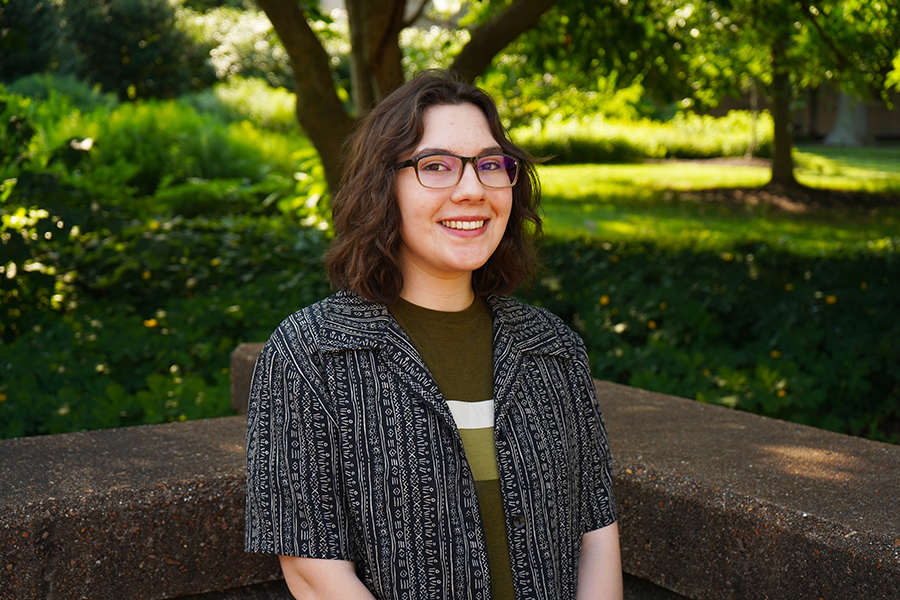
Growing up, Charlie Beecher loved being outdoors, searching storm drains for tiger salamanders or trees for bugs. Beecher grew up in Pullman, Washington, where she also enjoyed visiting the incredible orchards throughout the area.
It was during that time that Beecher found her love of nature and science. She carried that passion to Missouri when her family moved to the Kansas City area. Now, as Beecher embarks on the next step of her academic journey, she is excited to further her scientific pursuits at the University of Missouri.
Beecher is no stranger to the MU campus. Both of her parents received degrees from Mizzou and her sister, Margaret, is currently enrolled as a biochemistry major.
“Mizzou definitely felt like a natural fit,” Beecher said. “With my interest in life sciences and familiarity with what campus has to offer, MU was the best option for me.”
Beecher’s interest in Mizzou led her to browse through the large list of scholarship opportunities, which in turn helped her find the Stamps scholarship. Mizzou has partnered with the Stamps Scholars Program since 2016 on a premier scholarship for incoming Tigers. Scholars receive a full four-year scholarship, covering up to the total estimated cost of attendance, plus an additional $16,000 enrichment fund for them to use throughout their time at MU.
“I planned on applying for the Stamps scholarship early on, as I like having all my options laid out before I make a final decision,” Beecher said. “I was really honored to make it through each round – I honestly didn’t expect to make it as far as I did. Once I was named a Scholar, I couldn’t believe it. It was an unreal feeling. It’s a great program, and I’m extremely excited for the opportunities that will be available for me to pursue.”
Stamps Scholars must be enrolled in the Honors College for all four years, working toward the completion of the Honors certificate. Scholars have a dedicated mentor, contact with campus leadership, alumni networking opportunities and funding for study abroad, too.
Beecher is one of eight Stamps Scholars who will be at Mizzou this fall.
“I’m looking forward to joining this community of amazing Scholars,” Beecher said. ‘All of us have different paths that brought us here. Being able to discuss our passions and showcase our creativity is going to be amazing. We all have that same drive, and I’m excited for the friendships I can build with this group.”
Beecher will explore her interests in science through the plant sciences degree program. With three emphasis areas and multiple career possibilities, Beecher said the major would be a perfect fit.
“I’ve always been interested in plants and how they work,” Beecher said. “They’re fascinating. Plants are rooted in place, but they also have these mechanisms of movement plus an immune system. They’re kind of alien in a way. It’s a field that has so many opportunities, and I’m excited to study them in-depth, with the goal of making innovations that can better our lives and agriculture in general.”
Beecher is already looking forward to the undergraduate research opportunities she will be able to pursue through Stamps as well. Beecher participated in a research project during her senior year of high school. That work centered on a species of planarian, a flatworm commonly used in laboratory research.
“While I’ve had hands-on experiences in a laboratory, I’m ready to take that type of work a few steps further,” Beecher said. “Mizzou has so many incredible labs. It’s going to be incredible to play a small part in the amazing work that is being done.”
There are a handful of other interests that Beecher plans to explore at Mizzou, too, like urban gardening and beekeeping. She has already talked with fellow Stamps Scholar George Frees about beekeeping opportunities. Frees cares for bees across the Mizzou campus.
“I’m very interested in entomology, and I feel like it’s a field that lives within plant science,” Beecher said. “Plants and insects are intrinsically connected, and it’s key that we recognize that relationship. Pests and disease cause the biggest amount of crop loss. However, when we’re dealing with pests, we must do so in a way that protects our keystone species, like bees. It’s a complicated relationship and one that I would like to explore more.”